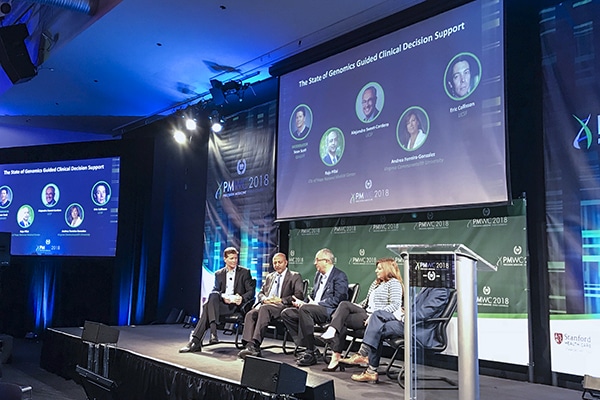The advent of genomics-guided precision medicine has the potential transform patient treatment decision support.
From data and analytics, to patient empowerment, recent advancements may indicate the industry is finally about to reach its most pivotal moment yet. A new era of personalized medicine—known as precision medicine—has arrived, and it’s opening a host of new possibilities for care providers that were unimaginable only a few years ago. Precision medicine takes into consideration every gene throughout a person’s genetic profile, and uses that data to identify the right targeted therapy for right patient at the right time. Precision medicine is accelerating at a rapid pace, thanks in part to Sean P. Scott and QIAGEN.
QIAGEN is global provider of molecular diagnostics solutions that enable customers to gain valuable molecular insights from samples containing DNA. QIAGEN delivers sample-to-insight solutions that provide the tools a laboratory needs for a complete end-to-end next-generation sequencing (NGS). From sample collection tubes to sample preparation, instrumentation, and software that analyzes, interprets, and reports NGS test results, QIAGEN supports each step of the workflow, enabling any lab around the world to achieve actionable insights in NGS. As the number of genomes sequenced each day continues to skyrocket and healthcare professionals increasingly rely on genetic information to enhance patient care, QIAGEN has made it critical to drive advancements in genomics-guided precision medicine.

These advancements in new targeted therapies, NGS sequencing technology, and genomics-guided precision medicine could have big implications for treating cancer, which is a genetic disease, where variants to genes lead to a risk or occurrence of the disease, and other rare genetic diseases such as those inherited variants which affect upwards of 10 percent of the global population.
This is why QIAGEN is committed to making significant investments in the commercialization and democratization of these important technologies and capabilities. While other companies tend to focus on the workflow instrumentation and ability to generate data, QIAGEN focuses more on creating actionable insights from the data. Therefore, QIAGEN does not just enable laboratories, but works alongside ordering physicians to identify opportunities for timely and actionable clinical decision support—which QIAGEN says is the last mile in the race for genomics-guided precision medicine.
While there has been meaningful progress, such as the transition from traditional anatomical description of cancer to their genomic stratification and profiling of patients based upon unique genetic markers versus the type of cancer, there remains considerable work to do relative to the standardization, adoption, and integration of genomics data with clinical data to enable genomics-guided precision medicine at the point of care, Scott says.
According to him, the current industry trends that are driving genomics-guided precision medicine include the shift from disease treatment to prevention, the need for less invasive biopsy methods and more personalized targeted therapies, and the departure from traditional anatomical descriptions of cancer to genomic stratifications, such as referring to a patient with breast cancer as HER2 positive. Although harnessing the power of new genomic technologies and NGS still presents some significant production and bioinformatics challenges, there is growing evidence that improved standards, guidelines, and practices will help genomics-guided precision medicine become one of the most effective ways to care for patients, Scott says.
In his role, Scott is primarily responsible for helping clinical molecular diagnostic and molecular pathology labs develop their dry lab capabilities to support and expand their current or planned NGS-based test services. Whether the labs are large reference labs, commercial speciality labs, or small labs within hospital systems, Scott and QIAGEN take a holistic approach to their consultations, considering the entire sample-to-insight workflow, collaborating with professional associations on the development of standards and guidelines, and democratizing the best practices of other QIAGEN customers for the benefit of everyone.
“No matter the size of the lab, we’re focused on helping them understand how to develop a more insightful and actionable report for the ordering physician. This enables the laboratory and the ordering physicians they serve to make better decisions for improved patient care and outcomes,” Scott says.
Although Scott has been working on the cutting edge of genomics-guided precision medicine for more than a decade, the field is still a relatively new concept within the healthcare industry, he says. Therefore, leaders like Scott are critical to the successful and responsible implementation of NGS-based tests within today’s clinical setting.
The healthcare industry is undergoing a dynamic shift away from DNA-based diagnostic testing toward theranostics and prognostics, and physicians are seeking supplemental information on treatment and trial options for their patients, Scott says. That means it’s imperative that healthcare providers embrace the full potential of genomic data and standardize NGS testing according to professional association guidelines and institutional best practices.
“When you talk to the ordering physicians who are trying to draw insights or make treatment decisions based on genetic test results, there’s still a large chasm between complete and accurate reports and reports that are insightful, actionable, or influential over the clinical decision-making process,” Scott says.
Genomics-guided precision medicine promises to transform healthcare, but for this potential to be fully realized, providers, payers, regulators, and industry insiders must work collaboratively to ensure the seamless integration of this new technology across the clinical setting, Scott says. The building blocks for such a system are already forming, and healthcare providers need to develop capabilities for genomic integration, molecular profiling, and applying clinical outcomes data at the point of care to accelerate the adoption of precision medicine.
“You will not see true genomics-guided precision medicine capabilities within provider networks until they can figure out how to best integrate genomics data with clinical outcomes data. I think that’s the real challenge right now,” Scott says.


